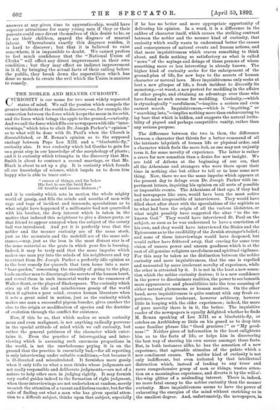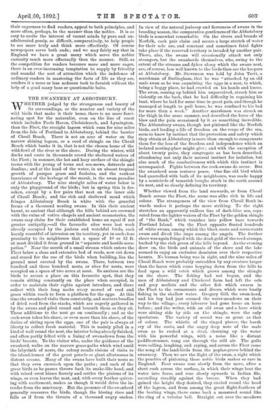THE NOBLER AND MEANER CURIOSITY.
CURIOSITY is our name for two most widely separated states of mind. We call the passion which compels the greater intellects of the world to discover,—as, for example, the connection between the force which keeps the moon in its orbit, and the force which brings the apple to the ground,—curiosity. And we call the force which fills our newspapers with idle "inter- viewings," which tries to elicit Dr. Joseph Parker's " opinion " as to what will be done with St. Paul's when the Church is disestablished, or M. Renan's opinion as to the supposed analogy between Pope Leo XIII. and a " bluebottle-fly," curiosity also. It was curiosity which led Goethe to gain for us a great step in our knowledge of the morphology of plants ; and it is curiosity which triumphs in the discovery that Mrs. Smith is about to contract a second marriage, or that Mr. Black is about to set up a gig. It is curiosity which founds all our knowledge of science, which impels us to deem him happy who is able to trace out- " causes of things, and far below His feet to see the lurid flow
Of trouble and insane distress ; "
and it is curiosity which sets in motion the whole mighty world of gossip, and fills the minds and mouths of men with rags and tags of incident and innuendo, speculations as to what might have happened if a millionaire had not quarrelled with his brother, the deep interest which is taken in the motive that induced this neighbour to give a dinner-party, or that friend to appear annoyed when the subject of the county ball was introduced. And yet it is perfectly true that the nobler and the meaner curiosity are of the same stock, just as the mountain and the molehill are of the same sub- stance,—nay, just as the iron in the most distant star is of the same material as the grate in which your fire is burning. Indeed, it may be truly said that the same impulse which makes one man pry into the minds of his neighbours and try to extract from Dr. Joseph Parker a perfectly idle opinion as to the best remedy for quarrels that turn home into a mere " bear-garden," concerning the morality of going to the play, leads another man to disentangle the secrets of the human heart, and reveal them in such immortal works as the romances of Walter Scott, or the plays of Shakespeare. The curiosity which stirs up all the idle and mischievous gossip of the world when it agitates a poor mind, creates human literature when it sets a great mind in motion, just as the curiosity which makes one man a successful pigeon-breeder, gives another the clue to the origin or modification of species and the doctrine of evolution through the conflict for existence.
Now, if this be so, that which makes so much curiosity mean and even malignant, is not anything radically perverse in the special attitude of mind which we call curiosity, but rather the general pettiness of the character which enter- tains it. Even the practice of interrogating and inter- viewing which is assuming such enormous proportions in the world, is not the unwholesome prying it is on the ground that the practice is essentially bad,—for all reporting is only interviewing under suitable conditions,—but because it is ill-directed and miscalculated. It furnishes mere gossip when it only tells us what a man thinks whose judgments are not really responsible and deliberate judgments,—are not of a nature to help other men in judging rightly. It may furnish very useful guides indeed to the formation of right judgment, when these interviewings are not undertaken at random, merely to catch the attention of a vacant and listless reader, but for the sake of finding out what a man who has given special atten- tion to a difficult subject, thinks upon that subject, especially
if he has no better and more appropriate opportunity of delivering his opinion. In a word, it is a difference in the calibre of character itself, which causes the striking contrast between the nobler and the meaner kind of curiosity, that curiosity which really wants to understand better the causes and consequences of natural events and human actions, and that mere inquisitiveness which craves something to think about, and finds nothing so satisfactory as what is called " news " of the sayings and doings of those persons of whom something more or less interesting is already known. The higher kind of curiosity seeks for the enlargement of the ground-plan of life, for new keys to the secrets of human character or natural laws. Mere inquisitiveness only seeks at best a new glimpse of life, a fresh incident to diversify its monotony,—at worst, a new pretext for meddling in the affairs of other people, and obtaining an advantage over those who have found no such excuse for meddling. Curiosity,—which is etymologically " carefulness,"—implies a serious and even earnest search. Inquisitiveness,—which is "inquiring," or " searching into,"—implies nothing more than endeavouring to lay bare that which is hidden, and suggests the natural irrita- bility of piqued and perhaps competitive vanity, rather than any serious purpose.
The difference between the two is, then, the difference between a character that thirsts for a better command of all the intricate labyrinth of human life or physical order, and a character which feels the mere itch, as one may not unjustly term it, for some novelty of experience. The latter is rather a crave for new sensation than a desire for new insight. We are told of Athens at the beginning of our era, that all the Athenians and strangers who were there spent their time in nothing else but either to tell or to hear some new thing. Now, there we see the same impulse which appears at the present day to deluge even Dr. Joseph Parker with im- pertinent letters, inquiring his opinion on all sorts of possible or impossible events. The Athenians of that age, if they had had newspapers like ours, would have been the most active and the most irrepressible of interviewers. They would have filled sheet after sheet with the speculations of the sophists as to what had been the origin of all the various idolatries, or what might possibly have suggested the altar " to the un- known God." They would have interviewed St. Paul on the subject, so soon as he was understood to have a conviction of his own, and they would have interviewed the Stoics and the Epicureans as to the credibility of the Jewish stranger's belief ; and none of these interviewings would have deepened, but would rather have frittered away, that craving for some true vision of unseen power and unseen goodness which is at the root of all genuine religious carefulness and spiritual vigilance. For this may be taken as the distinction between the nobler curiosity and mere inquisitiveness, that the one is repelled and nauseated by mere irrelevant novelty of experience, while the other is attracted by it. It is not in the least a new sensa- tion which the nobler curiosity desires; it is a new confidence in the power to discriminate realities, the power to see beneath mere appearances and plausibilities into the true meaning of either natural phenomena or human motives. On the other hand, mere inquisitiveness is quite content with any fresh ex- perience, however irrelevant, however arbitrary, however little in keeping with the older experiences ; indeed, the more of pure novelty there is in it, the better. The inquisitive reader of the newspapers is equally delighted whether be finds M. Renan speaking of Leo XIII. as a bluebottle-fly, or catches an Archbishop so little on his guard as to drop into some familiar phrase like " Good gracious !" or "My good- ness ! " Neither piece of information in the least enlightens bim as to the facts of life, or helps him in discovering the best way of steering his own course amongst those facts. But, in both instances alike, he has the sensation of a new experience, that agreeable stimulus of the palate which a new condiment causes. The nobler kind of curiosity is not only indifferent, but even irritated by that intellectual distraction which, instead of leading to any truer and more comprehensive grasp of men or things, wastes atten- tion on a meaningless experience, and diverts it by the will-o% the-wisp glitter of a misleading interest. There is, indeed, no more fatal enemy to the nobler curiosity than the meaner curiosity. Mere inquisitiveness seems to have the power of exhausting the energies of the mind without enriching us in the smallest degree. And, unfortunately, the newspapers, in their eagerness to find readers, appeal to both principles, and more often, perhaps, to the meaner than the nobler. It is so easy to excite the interest of vacant minds by pure and un- adulterated gossip, so difficult, comparatively, to help people to see more truly and think more effectively. Of course newspapers serve both ends ; and we may fairly say that in England we have a great many which serve the nobler curiosity much more effectually than the meaner. Still, as the competition for readers becomes more and more eager, there is an ever-increasing temptation to supply by frivolity and scandal the sort of attraction which the indolence of ordinary readers in mastering the facts of life as they are, renders it a more or less arduous task to furnish without the help of a good many base or questionable baits.



















































 Previous page
Previous page